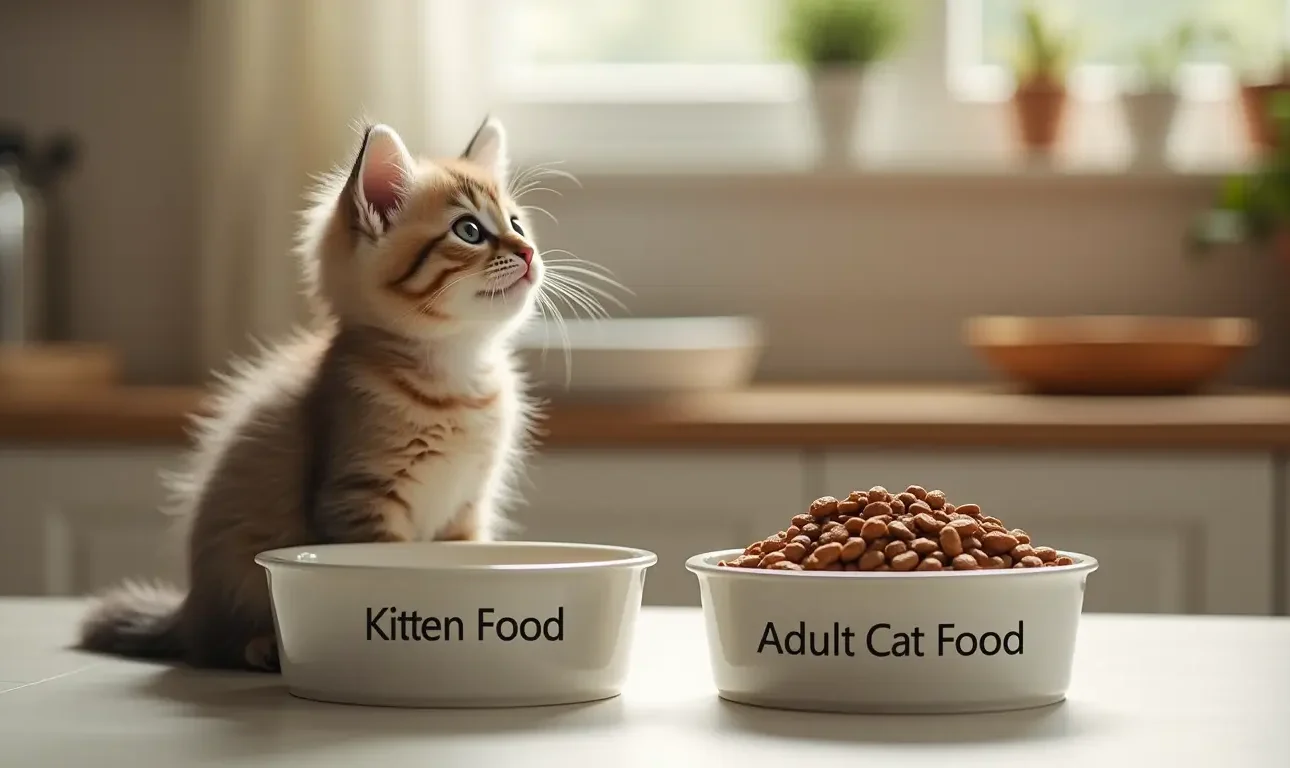When you bring a kitten into your home, one of the first things you’ll need to consider is their diet. As a pet parent, it’s natural to wonder whether you can feed your kitten the same food you give to your adult cat. After all, adult cat food is often more accessible and convenient, but is it suitable for your growing kitten? The short answer is no—kittens have specific nutritional needs that adult cat food simply cannot meet. Kittens require a diet rich in protein, fat, and essential nutrients to support their rapid growth and development. In this article, we’ll explore why adult cat food isn’t ideal for kittens, the potential risks involved, and the best alternatives to ensure your kitten receives the nutrition they need during their crucial early stages of life.
Table of Contents
Can Kittens Eat Adult Cat Food?
What is Adult Cat Food?
Adult cat food is specifically formulated to meet the nutritional needs of mature cats, typically over one year of age. It differs from kitten food in several key ways, particularly in its calorie content, protein levels, and fat composition. Adult cat food tends to have fewer calories and less protein and fat than kitten food, as adult cats require less energy and nutrients due to their fully developed bodies. Kittens, on the other hand, need more concentrated nutrients to fuel their rapid growth and active lifestyles.
Why Adult Cat Food Isn’t Ideal for Kittens
Adult cat food isn’t suitable for kittens because it lacks the essential nutrients necessary for proper growth and development. Kittens require higher levels of protein and fat to support their growing muscles and tissues, as well as additional vitamins and minerals to strengthen their immune systems. Adult food often contains lower levels of vital nutrients like taurine, an amino acid crucial for kittens’ heart and eye health. Without these nutrients, kittens can experience stunted growth, weakened immune systems, and other health issues.
Nutritional Needs of Kittens
Kittens have unique nutritional needs that are different from adult cats. They require a diet rich in high-quality protein to support muscle growth and development. Essential fatty acids, such as omega-3 fatty acids, are also critical for brain development, vision, and healthy skin. Additionally, kittens need higher levels of vitamins like taurine, which is essential for heart and eye health. A balanced diet that includes all these nutrients is crucial for kittens to grow into healthy, strong adult cats.
The Risks of Feeding Adult Cat Food to Kittens
Imbalanced Nutrients for Growth
Adult cat food is not designed to support the rapid growth of kittens. It typically contains an imbalanced ratio of fats, proteins, and vitamins compared to kitten food. Kittens need higher levels of protein and fat to fuel their growing bodies, as well as additional vitamins and minerals like calcium and phosphorus to support bone development. Feeding them adult cat food, which has lower levels of these essential nutrients, can prevent them from reaching their full growth potential.
Potential Digestive Issues
Kittens have more sensitive digestive systems than adult cats, and feeding them adult food can lead to digestive upset. The ingredients and nutrient levels in adult cat food may be too rich or too harsh for young kittens, potentially causing stomach discomfort, diarrhea, or constipation. Since their bodies aren’t equipped to handle these ingredients in the same way as adults, kittens may also struggle to absorb the nutrients they need, which can further compromise their health and development.
Health Concerns
In the long term, feeding kittens adult cat food can lead to serious health issues. A diet lacking the proper nutrients for growth can result in stunted development, affecting muscle, bone, and organ formation. Kittens may experience delays in reaching key milestones, such as gaining weight or developing strong muscles and bones. This can lead to long-term issues like weakened immunity, joint problems, or even developmental disorders. Ensuring your kitten receives the right nutrition during their formative months is crucial for a healthy, active adulthood.
When Can Kittens Transition to Adult Cat Food?
Age Guidelines for Transition
Most kittens are ready to start transitioning to adult cat food at around 12 months old. By this time, they have reached the end of their rapid growth phase and are approaching adulthood. However, the exact timing can vary depending on your kitten’s breed, size, and overall development. Larger breeds, like Maine Coons, may take longer to reach maturity and could benefit from a longer period of kitten food. Consulting your veterinarian can help determine the best time for your kitten’s specific needs.
Signs Your Kitten is Ready for Adult Food
There are several physical and behavioral signs that indicate your kitten is ready for adult food. One of the main signs is weight gain, as your kitten may stop growing at a rapid pace and start to gain more steady weight. You may also notice a slowing down in their activity levels and a decrease in the frequency of their growth spurts. Additionally, if your kitten has reached their optimal weight and their teeth are fully developed, it’s often a sign that they are ready to begin the transition to adult food.
How to Gradually Transition
When transitioning your kitten to adult food, it’s important to do so gradually to avoid digestive upset. Start by mixing a small amount of adult food with their kitten food, and gradually increase the proportion of adult food over the course of 7-10 days. This slow transition allows your kitten’s digestive system to adjust to the new food without causing issues like diarrhea or vomiting. Be sure to monitor their response and consult your vet if you notice any signs of distress.
Best Alternatives to Adult Cat Food for Kittens
High-Quality Kitten Food
The best alternative to adult cat food for kittens is high-quality, kitten-specific food. Kittens require a diet that is rich in protein, fat, and essential nutrients to support their rapid growth and development. When selecting kitten food, you can choose between wet food and dry food, depending on your kitten’s preferences and dietary needs. Wet food is generally more hydrating and easier to digest, while dry food can help with dental health. Reputable brands such as Hill’s Science Diet, Royal Canin, and Blue Buffalo offer balanced formulas designed to meet the unique nutritional needs of kittens, ensuring they receive the right amount of calories, vitamins, and minerals for optimal health.
Homemade Kitten Food Options
For those interested in preparing homemade meals for their kittens, it’s crucial to ensure that the food is nutritionally balanced. While homemade meals can offer fresh and natural ingredients, they must be carefully prepared to meet the specific needs of growing kittens. A vet or pet nutritionist can help create a balanced meal plan, often incorporating ingredients like lean meats, eggs, and certain vegetables, along with necessary supplements to ensure proper growth. Homemade food should be rich in protein and healthy fats and must avoid ingredients harmful to cats, like onions or garlic.
Supplementing with Treats and Other Foods
In addition to a high-quality kitten food, you can supplement your kitten’s diet with safe treats and other foods that promote health and growth. High-protein treats designed for kittens can help support muscle development, while kitten-safe vegetables like cooked carrots or peas can provide extra nutrients and fiber. However, treats should be given in moderation to avoid overfeeding. Always ensure that any supplement or treat you offer is specifically formulated for kittens to avoid any potential risks associated with adult cat products.
Expert Tips for Choosing the Right Food for Your Kitten
Reading Kitten Food Labels
When selecting food for your kitten, it’s essential to read the label carefully to ensure it meets their nutritional needs. Look for high protein content, ideally from animal sources like chicken, turkey, or fish, as protein is crucial for muscle development. The label should also list DHA (Docosahexaenoic acid), an omega-3 fatty acid that supports brain and eye development. Additionally, pay attention to the calcium-to-phosphorus ratio, as this is vital for healthy bone growth. A good kitten food will provide a balanced blend of these nutrients to support your kitten’s rapid development.
Consulting Your Veterinarian
Consulting your veterinarian is key when choosing the best food for your kitten. A vet can offer tailored advice based on your kitten’s specific breed, health, and any dietary restrictions they might have. For instance, some breeds may require higher levels of certain nutrients, while kittens with sensitive stomachs may benefit from specialized formulas. Regular check-ups also allow your vet to monitor your kitten’s growth and make adjustments to their diet as needed, ensuring they are getting everything they need for optimal health.
Understanding Kitten Development Stages
Kittens go through several development stages, and their nutritional needs change as they grow. In the first few months, they require nutrient-dense food to support their rapid growth and high energy levels. As they reach around 6 months, their nutritional requirements start to stabilize, but they still need food designed for their growing bodies. By the time they reach around 12 months, they are transitioning into adulthood, and their food should gradually shift from kitten-formulated to adult cat food. Understanding these stages helps ensure your kitten receives the right diet at the right time for healthy growth and development.
Conclusion: The Importance of Proper Nutrition for Kittens
In this article, we’ve explored why kittens should not eat adult cat food, emphasizing the critical differences in their nutritional needs. We discussed how adult cat food lacks the necessary protein, fats, and vitamins essential for a kitten’s growth and development, which can lead to digestive issues and long-term health concerns. Kittens require food that is specifically formulated to support their rapid growth, with key nutrients like protein, DHA, and calcium in the right ratios. Kitten-specific food ensures they receive all the nutrients needed for healthy development, making it the best choice for your young pet.
Proper nutrition is the foundation of a healthy and happy kitten. By providing high-quality kitten food and consulting your veterinarian for tailored advice, you are setting the stage for your kitten’s optimal growth and lifelong health. Remember, the first year of life is critical for shaping your kitten’s well-being, so make sure they are getting the right nutrition to thrive.
FAQ: Can Kittens Eat Adult Cat Food?
1. Can kittens eat adult cat food occasionally?
While it’s okay for kittens to have adult cat food in small amounts occasionally, it should not replace their regular diet. Adult cat food lacks the nutrients necessary for healthy growth, such as the higher protein and fat levels that kittens need. Rely on kitten-specific food for their everyday meals to ensure they get the right nutrition.
2. What happens if a kitten eats adult cat food?
Feeding a kitten adult cat food regularly can lead to nutrient deficiencies, digestive issues, and stunted growth. Kittens have unique dietary needs, and adult food lacks the essential nutrients like higher protein, DHA, and calcium required for their development. Long-term feeding of adult food can impact their overall health and development.
3. At what age can I start feeding my kitten adult cat food?
Most kittens can start transitioning to adult cat food around 12 months of age. By this time, they have usually reached their full growth potential and are ready for the less calorie-dense diet of adult food. Always consult with your veterinarian to ensure your kitten is ready for the switch based on their individual growth.
4. Can I feed my kitten homemade food instead of commercial kitten food?
While homemade food can be a good alternative, it’s important to ensure it meets all of your kitten’s nutritional requirements. Homemade meals should be prepared with the guidance of a veterinarian or pet nutritionist to ensure they are properly balanced. This might include high-protein meats, essential fatty acids, and the right balance of vitamins and minerals.
5. How should I transition my kitten from kitten food to adult food?
To transition your kitten to adult food, start by mixing a small amount of adult food with their kitten food. Gradually increase the proportion of adult food over the course of 7 to 10 days to avoid digestive upset. Monitor your kitten for any signs of distress, and if problems arise, consult your vet.
6. What are the best brands of kitten food?
Some highly recommended kitten food brands include Hill’s Science Diet, Royal Canin, Blue Buffalo, and Wellness. These brands provide well-balanced, nutrient-rich formulas designed to meet the specific needs of growing kittens. Always look for food with high-quality protein sources and essential fatty acids like DHA.
7. Are there any safe treats for kittens?
Yes, there are kitten-safe treats available that can complement their diet. High-protein treats designed specifically for kittens can support muscle development, while small amounts of kitten-safe vegetables like cooked carrots or peas can offer additional nutrients. Treats should be given in moderation to avoid overfeeding.
8. How do I know if my kitten is getting enough nutrients?
A healthy kitten should be growing steadily, gaining weight appropriately, and showing signs of energy and curiosity. Regular vet check-ups will help ensure that your kitten’s diet is meeting their nutritional needs. Your vet can monitor their growth, development, and overall health to make any necessary adjustments to their food.






